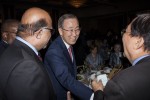United Nations secretary-general asked Los Angeles community members to help address global climate change problems and adopt the U.N.’s sustainable development goals in a speech Tuesday.
Ban Ki Moon, the eighth secretary-general of the U.N., spoke to 350 alumni, students and community members who attended the event organized by the Los Angeles World Affairs Council, the UCLA Burkle Center and the RAND Corporation. Ban, who is finishing his last few months in office after two five-year terms, addressed current challenges the global community and United Nations face.
Ban said the Paris Agreement to reduce climate change was the first step in addressing this environmental issue. He said it is important that the world leaders who will sign the agreement on April 22 participate in another meeting to discuss the future of the agreement.
He added he thinks California is at the forefront of the global climate change revolution and mentioned Gov. Jerry Brown’s role in the Paris climate change talks.
Ban, who said his job is often termed as the most impossible job in the world, said he often faces the brunt of world powers who don’t agree on various world issues.
“My job is abbreviated as SG,” Ban said. “Scapegoat. If the major world powers are not happy, things get dumped on the SG.”
While addressing the issue of the refugee crisis in Syria, Ban recounted his experiences growing up as a displaced person in a time of war in South Korea.
“I was 6 years old,” he said. “I didn’t know what the world was like, but I just knew my stomach was hungry.”
Ban recounted memories of his parents running around town trying to find food for their six children. The only form of assistance was provided by the U.N. in the form of food, books and clothing.
“For us, the United Nations was a beacon of hope,” Ban said. “The blue flag was our lifeline.”
The secretary-general said he thinks world leaders should dispel representations of refugees as demons at a time when 4.8 million people have been displaced from their homes and require humanitarian assistance. He added he thinks these representations are not only offensive but highly inaccurate, because refugees are dedicated to education and contributing to the economy.
Ban said the U.N. special envoy for Syria, Staffan de Mistura, has concluded the first round of talks with several parties in Syria last month, in an attempt to solve the refugee crisis. The second round of meetings will be held next week, he added.
The audience applauded as he announced the U.N. has been providing assistance to about 800,000 Syrians and aims to reach out to about 1 million by the end of April.
“Refugees have a right to asylum,” he said. “Today’s refugee crisis are a sign of deeper challenges we face.”
The secretary-general added all world leaders, community members and students should support national efforts to reach the Sustainable Development Goals, or SDGs, during such a turbulent time in world affairs.
Ban said, the SDG, which was adopted by all member nations of the United Nations in September, functions as a blueprint to help fight issues such as climate change, poverty and gender inequality. The SDG includes measures to ensure equal rights to economic resources, development of pro-poor and gender-sensitive development strategies and transforming climate change measures to national policy.
Ban highlighted the key role of the United States in helping solve various humanitarian issues worldwide and supporting the mission of the U.N.
When asked from a member of the audience about whether he thinks the outcome of the presidential election might affect the implementation of the SDG, Ban said he thinks this is not a political issue.
“This is something that the international community should do together,” he said. “No country is immune from the impact of climate change, poverty or disease.”
An audience member asked Ban about the criticisms of the United Nations in being biased against Israel. In response to the question, Ban said the U.N. doesn’t have a bias against Israel and he thinks when certain member nations of the U.N. treat Israel differently, often the public perceives this as the U.N.’s bias against the nation.
Ban added he thinks one of the major goals of the United Nations continues to be to strive to achieve equal rights for people regardless of their sexual orientation, gender, religion, nationality or anything else.
“We face great challenges, but our capacity to solve them is greater than ever,” Ban said.
